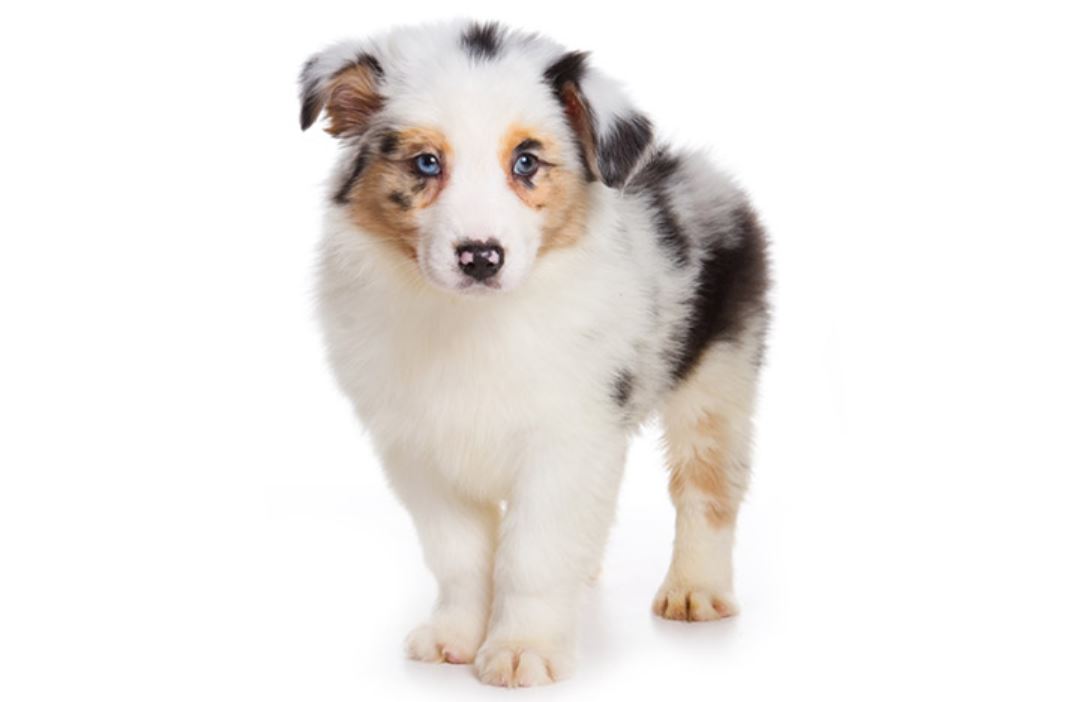Golden Retriever vs Australian Shepherd – Which Dog Should You Get

When buying a dog, it can be very difficult to know which breed to buy and there are many factors to consider. Australian Shepherds and Golden Retrievers are two very popular breeds.
Both breeds display similar characteristics so it can be difficult to decide between them. However, it may be the differences between the two breeds that are the deciding factors.
Golden Retriever vs Australian Shepherd – History & Origins

Golden Retriever (Golden)
Golden Retrievers originated in the mid 1800’s, in the highlands of Scotland, and were developed by Dudley Marjoribanks, Lord Tweedmouth.
The Retrievers used for shooting game were inadequate for retrieving birds from both land and water.
Lord Tweedmouth overcame the shortfalls by breeding from a Yellow Retriever and a Water Spaniel, and their ‘soft mouths’ didn’t damage the game.
Australian Shepherd (Aussie)
The Australian Shepherd breed has a well-travelled history. Coming to popularity in America during the Gold Rush of the 1940’s, the ‘Aussie’ originated from the Basque province.
These experienced shepherds travelled to the vast landscapes of Australia, breeding their Pyrenean Shepherds with the Collies of Britain, before moving onto California where the dogs finally evolved into the breed we recognise today.
Similarities |
Differences |
| First bred in 1800’s. Recognised as purebreds in 1900’s | The Golden Retriever originated in Scotland whilst the Australian Shepherd evolved across continents |
| Working dogs, originally bred for purpose | The Aussie is a herder. The Golden is a sporting gundog |
Golden Retriever vs Australian Shepherd – Comparison Chart

Golden Retriever |
Australian Shepherd |
|
Size |
51-61cm high – 25-34kgs (55-75lbs) dependent upon sex | 48-58cm high – 18-29kgs (40-62lbs) dependent upon sex |
Coat |
Medium length thick, wavy coat, with a water-repellent under coat. | Medium to long fur with a water-repellent under coat. |
Personality |
Eager to please, friendly, devoted | Loyal, protective, obedient |
Temperament |
Intelligent, playful, even-tempered | Smart, hard working, energetic |
Tendency to Bark |
Significantly less than other breeds | Like to hear themselves bark, will bark at anything, and to discharge energy |
Biting Potential |
Gentle mouthiness | Nips at moving objects |
Intelligence |
Very intelligent, excellent memories | Very intelligent, problem solvers |
Shedding Level |
Sheds heavily, mainly in spring and autumn | Sheds heavily, mainly in spring and autumn |
Exercise Needs |
Needs plenty of exercise | Needs plenty of hard exercise |
Apartment Dog? |
& Not ideal |
Need access to a back garden or yard |
Health Issues |
Prone to elbow and hip dysplasia, arthritis, cataracts, certain heart conditions | Prone to hip dysplasia, epilepsy, cataracts and certain cancers |
Life Expectancy
|
10 to 12 years | 12-15 years |
Size & Appearance
Both the Aussie and the Golden are medium sized, sturdy, muscular breeds. They have medium length wavy coats with some feathering around the legs, but that is where the similarities end.
As their name suggests, Goldens are golden, and shades vary from light to dark gold. They have brown eyes, a smiley mouth, and long feathered tails.
Aussie’s coats, although of medium length, tend to be longer than the Golden, with a substantial mane around its neck and chest. Their tails tend to be naturally bobbed.
They have merle patterned coats, in colours classed as red, blue and black. Aussies can have brown, amber, blue, or green eyes, which combined with their coats make them an interesting looking breed.
Similarities |
Differences |
| Medium sized dogs | Aussies have a patterned coat |
| Medium length wavy coats | Aussies have a variety of eye colours |
| Sturdy and muscular | Goldens have long tails. Aussies tend to have bobbed tails |
Character & Personality
These breeds are intelligent, energetic, loyal and loving. They are good with other animals if properly socialised and they are excellent family dogs, particularly if that family is an active one.
Because of their energy and intelligence, neither breed does well if left unattended for any period of time and will become destructive; Aussies in particular.
Both breeds will need supervision around young children as these dogs do ‘bump’ into things, and those Aussies are likely to try and herd your young humans as well.
If you are looking for a guard dog, then don’t go for a Golden. They are likely to greet strangers with a furiously wagging tail, and their favourite ball in the hope of a game of ‘fetch’.
Aussies are the guard dogs as they are fiercely protective. Any newcomers will have to be introduced properly. But beware, if they can escape, they will, and they will go walkabout.
Similarities |
Differences |
| Energetic, exuberant, active | Aussies are good guard dogs. Goldens are more welcoming |
| Affectionate, good with families | Goldens are good with most animals. Aussies are good with other dogs if socialised. |
| Easy to train | Aussies like to wander |
| Will chew if bored | Aussies can be nippy |
As Puppies

Golden and the Aussie puppies will need to be socialised, gradually and fully. If not, their size, energy and power will cause problems as they mature.
The Golden will carry his playful boisterous behaviour into adulthood, including the tendency to be ‘mouthy’.
The Aussie will quickly try to be dominant if not taught otherwise, and its natural ‘nippy’, herding instinct will need to be kept in check. So, for both breeds, puppy training is a must.
Also, because both breeds are prone to joint problems, they will need to be exercised on grass until their skeletons are fully developed. Consult your vet for proper advice.
Similarities |
Differences |
| Early socialisation and training are needed | Goldens will always be puppies at heart. |
Grooming & Maintenance
Brushes, raking combs, doggy shampoos and toothpaste, and cotton wool for cleaning ears, need to be added to your list of essentials for your Aussie and your Golden, particularly the Golden.
Ideally both dogs will need to be groomed daily, as their coats will quickly collect dust and dirt. Plus, those coats will mat and lead to skin conditions, if not looked after.
They both have water-repellent undercoats so brushing needs to be thorough.
Clean those ears and teeth, and clip those claws (carefully) to keep your pet happy and healthy.
The Golden will need to be bathed more regularly, at least once a month, but this shouldn’t be a problem for that water baby.
Similarities |
Differences |
| Need regular grooming, bathing, ears and teeth need regular cleaning, claws need to be clipped | Goldens will need more frequent bathing |
Education and Training
Both of these breeds will need socialising from about 7 weeks, and proper puppy training. Aussies will also need obedience training as they will need to know who is in charge.
Whichever breed you choose, you want your dog to be well-mannered, sociable and obedient.
Intelligent and eager to please, these dogs respond well to reward based training.
Similarities |
Differences |
| Socialising and puppy training required – reward-based training | Obedience training advisable for Aussie’s |
Exercise Needs

If you aren’t active yourself, then neither of these dogs are for you. Two walks a day for at least 30 minutes each.
They will need to run, play, and then they will want to run some more.
If you run yourself, or cycle, take your dog. You will both love it.
Now, the Golden will eat anything. Keep your cupboards closed, make sure your bins are secure, and don’t accidentally drop anything from the dinner table.
Because of their tendency toward putting on weight, they will definitely need their walks, or preferably, their runs.
The Aussie will need more exercise than the Golden and the more adventurous, the better. They will definitely need access to a back garden or yard, for additional running time. But best of all, give them a job.
These dogs can work and exercise all day, so be prepared to put in the time and energy yourself. If you don’t, they will take their exercise regime into their own paws, and you will have a search on yours.
Similarities |
Differences |
| Regular daily exercise | Aussies need access to a yard or back garden as well as daily walks |
| Both do well with active owners | Give an Aussie a job to do |
Health Problems
Both breeds are generally healthy, if they are cared for properly. However, these active breeds are prone to joint problems, especially hip dysplasia.
They also are also both prone to epilepsy, ear infections if their ears aren’t cleaned, cataracts and other eye issues.
Joint and eye evaluations should have been undertaken by the breeders on the parents of your prospective puppy, and you should ask for the documentation.
In addition, Goldens are susceptible to Ichthyosis, which is a thickening of the footpad, and Aussies, certain cancers and thyroid problems. Aussies are also inclined towards deafness.
Similarities |
Differences |
| Joint issues. Eye issues. Epilepsy | Aussies are prone to certain cancers and thyroid problems, Goldens are prone to Ichthyosis |
Golden Retriever vs Australian Shepherd – Cost
The price of buying a dog is going to vary, whichever breed you decide upon. A lot depends on the age of the dog you are buying, their breed and temperament, but also where you buy from.
If you can, buy from a reputable and registered breeder.
The average price you would expect to pay for a Golden would be £1200, and you should expect to pay out about £110 per month on their upkeep.
The average price for an Aussie is a little lower at around £1000. Their monthly cost is approximately £65.
Golden Retriever vs Australian Shepherd FAQ’s
Do Australian Shepherds shed more than golden retrievers?
Both Goldens and Aussies shed all year round, but particularly in spring and autumn. Their longer coats and think undercoats will need managing.
Aussies will probably shed slightly more, but there isn’t much in it. But whichever breed you choose, don’t lose their brush, and expect to use the hoover daily.
Do Australian Shepherds get along with golden retrievers?
If each dog has been properly socialised as a pup, and they are gradually introduced to one another, then there should be no problem.
They both have bundles of energy and will happily run around together in your yard or garden. However, because of their innate herding instinct the Aussie can nip, but generally they should make a good pairing, but only if you have the space, and the energy.
Do Australian Shepherds need another dog?
Boredom can be an issue with Aussies, and you really don’t want to find out how destructive they can be if not entertained.
So, a doggie companion is ideal for an Aussie, especially if their friend is energetic, easy going, and tolerant. But again, make sure you have the space for them to play together.
Main Similarities
These breeds are similar in most aspects, size, temperament, intelligence, and energy levels.
They both make good family pets. Aussies and Goldens need a lot of exercise and grooming, and attention.
Main Differences
Although they are of a similar size, their appearance is most definitely not. Goldens are, as I have said, golden and you won’t see a red or brown dog in this breed.
Aussies are distinctive, with a colourful patterned coat, and if they have a light eye colour, they are striking. But both breeds are stunningly beautiful.
Which Dog Is Better?
Both dogs can be wonderful pets, and loving members of your family. However, we would say that Golden Retrievers were the better option.
The American Kennel Club ranks the Golden at the third most popular of 196 breeds. The Aussie is ranked at number 17.
The Aussie’s instinctual herding behaviour makes them inclined to nip.
Their inexhaustible energy, and constant need for attention and mental stimulation can be a little too much for some owners, and unfortunately this is often the reason that these wonderful dogs end up in shelters.
Conclusion
We have talked a lot about these breeds, but what are you like as the owner? Well, you are energetic, attentive, disciplined, tolerant, and you have plenty of time and space.
Whichever breed you choose, you will have a loyal, loving addition to your family. As with any animal, the more time and care you put in, the happier, and more well-behaved your pet will be.


